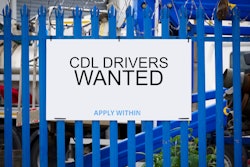It’s no secret that truck driving is one of the unhealthiest occupations in the U.S. because of the negative effects from unhealthy workplace environments and unfavorable working patterns.
Many drivers develop numerous health conditions over the span of their careers, including obesity, sleep apnea, diabetes, high blood pressure and heart problems due to inactivity, poor food options on the road and irregular schedules. The average life expectancy of a commercial truck driver is only 61 years – 16 years lower than the national average, according to the Centers for Disease Control and Prevention.
There are tons of articles online that advise drivers on how to stay healthy; there are different apps designed to help drivers improve health; and Interstate Health (IHS), a technology-enabled medical services company that supports the health needs of commercial truck drivers, recently broke ground on its first driver-focused clinic near a truckstop in Port Wentworth, Georgia, as part of its plan to provide urgent care, primary care and telemedicine services along the nation’s interstate highway system because one of the primary barriers drivers have to healthcare is access while over the road with little or irregular home time to schedule appointments when off the job.
Though IHS plans to open 300 locations across the U.S. over the next six years, helping drivers gain critical access, drivers still face a financial burden that rivals their salaries.
My grandmother was still writing small checks to the hospitals my grandfather visited well after his death. The man, who drove a truck since before I was born, died from heart failure, but he suffered from all of the medical conditions listed above. He never was able to drive enough to retire, and when those wheels stopped turning, the money stopped coming, leaving his wife under a pile of white envelopes stamped “Past Due.”
Healthcare bills are the top cause for bankruptcy among American families, according to the American Bankruptcy Institute, and Resolve, a company that helps patients navigate complex medical bills and reduce or eliminate the amount they owe, said they get many calls from truck drivers as medical bills are a major source of their debt.
A Resolve representative told me it’s because drivers' insurance covered very little of their care (or none at all) because they’re generally outside of their coverage area when they stop for healthcare while over the road, leaving them with high out-of-pocket costs.
[RELATED: Fleets turn to alternative healthcare options to aid drivers, control costs]
Some trucking companies don’t provide insurance for their drivers at all while others do, but coverage all depends on the type of insurance the company provides.
If your trucking company isn’t providing plans that are typically accepted, you’re not doing yourself any favors when recruiting by saying you offer health insurance. For example, my cousin joined a company last year, and she was excited to have health insurance for the first time being from a rural town whose small companies primarily offer minimum wage and zero benefits. That excitement was quickly deflated when she discovered no health care providers in the area accept her plan.
Offering health insurance can be a great recruiting tool, but carriers shouldn’t trick potential drivers into accepting a job based on that alone. They should be transparent up front about the value of their health plans. Better yet, provide a policy – or at least the option for a policy – that not only is widely accepted but also covers your drivers at healthcare providers across the U.S. While the premium may cost more to your company and/or your drivers, it will cost less for them on the back end. Educate them about the benefits to having such a plan. Employer-purchased policies typically provide coverage where that employer is based, and if a driver based in Alabama falls ill in Colorado, they’ll be paying much more out of pocket.
If your driver is like my grandfather and avoids the doctor because of the cost, you’re looking at losing that driver to health issues well before their career span is over in an industry that is already suffering from a shortage of workers.












